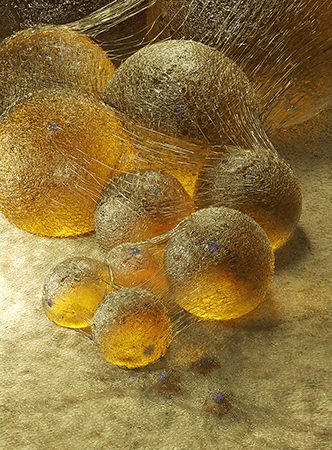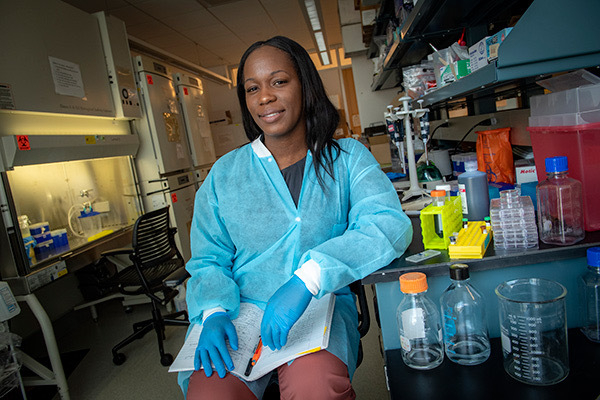News All News
June 2nd, 2021
Harvard licenses technology to Obatala Sciences to advance discovery in obesity, diabetes, and cancer
Development by New Orleans biotech company to enable studies of human fat tissue in vitro

Artist’s rendering of adipocytes. (Courtesy of Disease Biophysics Group, Harvard SEAS.)
Cambridge, Mass., and New Orleans (June 2, 2021) – Harvard University has granted an exclusive license to biotechnology company Obatala Sciences to commercialize innovations that enable the study of human fat tissue in vitro. Harvard Office of Technology Development and Obatala, which manufactures stem cell and hydrogel products to enable next-generation therapeutics discovery, announced the agreement today.
Obatala Sciences operates in the organ-on-a-chip or microphysiological system industry, a fast-growing scientific field that enables pharmaceutical companies to better model human response to therapies, in comparison to traditional laboratory approaches. The licensed Harvard technology, an adipose-on-a-chip, provides a method of obtaining adult-size fat tissue cells for study in vitro and enables the testing of weight loss and cancer-targeting therapeutics without the need for testing in animals. The adipose chips can respond to starvation and simulated meals, and they demonstrate key hormonal activity that is a hallmark of adipose as a functional organ. This ground-breaking technology provides a more accurate and dynamic model of human tissue in its diseased state compared to traditional two-dimensional culture.
The adipose chips were developed by researchers led by Kit Parker, PhD, the Tarr Family Professor of Bioengineering and Applied Physics at Harvard John A. Paulson School of Engineering and Applied Sciences (SEAS) and Associate Faculty member of Harvard’s Wyss Institute for Biologically Inspired Engineering. Parker’s lab at Harvard SEAS developed and demonstrated novel methods of culturing human fat cells to model a diseased state in vitro. The findings were published, for example, in the journal Lab on a Chip (2020). The worldwide license agreement with Harvard enables Obatala to make the technology widely available for researchers’ use in drug discovery and R&D.
As a key part of its mission, Obatala promotes diversity in clinical research with the goal of speeding up the development of better therapies for diseases like obesity, diabetes, and cancer, which disproportionately affect minority populations. The company has rapidly grown to establish a robust pipeline of stem cells, unique human-derived hydrogels, and media products that combine to mimic tissue from patients of specific populations.
“We are elated to be able to expand access to transformational research tools from Harvard that may help speed up the research and discovery of better treatments for patients who are traditionally excluded from clinical trials and those who need them the most,” said Obatala Sciences CEO Trivia Frazier, PhD, MBA. “The adipose chip technology provides us another crucial tool to promote diversity in research and improve outcomes for all patients. Organ-on-a-chip technology is revolutionary and may forever change the way we approach drug discovery on a global scale.”

"The adipose chip technology provides us another crucial tool to promote diversity in research and improve outcomes for all patients," said Obatala Sciences CEO Trivia Frazier, PhD, MBA. (Image courtesy of Obatala.)
“I am excited for the translation opportunity that the license to Obatala represents for these technologies developed in the Disease Biophysics Group at Harvard,” Parker said. “Trivia and I have talked for almost a year now and share a vision of how organs on chips can enable innovation in the pharma and biotech industries, and how the spin-off technologies represent new therapeutic opportunities in and of themselves. I’m hopeful that my lab’s innovations in tissue engineering may lead to numerous impactful uses of synthetic adipose, including this effort to accelerate the development of better treatments for disease.”
Frazier, a New Orleans native, said Obatala is the first life sciences firm based in New Orleans that is run by an African-American woman. To date, Obatala has received more than $2 million in federal funds to support the commercialization of its hydrogels and media products, and it has made history as the first minority female-owned firm to raise over $1 million in institutional funds to grow a biotechnology enterprise in Louisiana.
The license agreement with Harvard, Frazier said, will help Obatala expand its offerings of microphysiological systems that biomedical researchers can use to mimic various tissues throughout the human body. In consideration for the license, the university has received equity in the company and is eligible to receive royalties on resulting products. The license agreement also includes global access provisions, in keeping with Harvard’s longstanding commitment to promote equitable access to technologies of significant public health benefit in developing countries.
About Harvard Office of Technology Development
Harvard’s Office of Technology Development (OTD) promotes the public good by fostering innovation and translating new inventions made at Harvard University into useful products that are available and beneficial to society. Our integrated approach to technology development comprises sponsored research and corporate alliances, intellectual property management, and technology commercialization through venture creation and licensing. More than 70 startups have launched to commercialize Harvard technologies in the past 5 years, collectively raising more than $2.5 billion in financing. To further bridge the academic-industry development gap, Harvard OTD manages the Blavatnik Biomedical Accelerator and the Physical Sciences & Engineering Accelerator. For more information, please visit https://otd.harvard.edu.
About Obatala Sciences
Founded in 2017 with the goal of advancing research in the fields of obesity, diabetes, and regenerative medicine, Obatala Sciences is a biotechnology company that offers research products and services to scientists in medical industries and academia. Obatala prides itself in making high-quality products that researchers use to discover better therapies for diseases that significantly impact the human population. Obatala is named for the West African deity tasked with sculpting the human body. Co-founded and run by an African-American female from New Orleans, Obatala Sciences is committed to creating more accurate models of human tissue, starting with their building blocks: the cells. For more information, please visit ObatalaSciences.com.
Tags: Licensing, Drug Development, Bioengineering, Startups
Press Contact: Kirsten Mabry | (617) 495-4157
